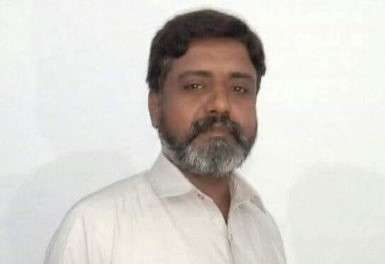There are moments in life when words seem to fail—when headlines bleed with pain too heavy to bear, and the soul of a nation trembles beneath the weight of its silence. One such moment unfolded in the city of Peshawar, where Nadeem, a Hindu man, was shot dead in cold blood—for simply refusing to abandon his faith.
Let that sink in.
He wasn’t armed. He wasn’t a criminal. He was simply a man holding on to the belief he was born into. And for that, he paid the ultimate price. His name—Nadeem—now joins a growing list of martyrs who dared to stay true to their conscience in a land where such courage is often met with a bullet.
His murder wasn’t just a crime—it was a message. A chilling reminder to every non-Muslim in Pakistan that their lives hang in the balance of religious extremism, that their safety can be so easily stripped away, and that their cries for help continue to echo in chambers that never respond.
Just weeks before Nadeem’s death, another heartbreaking story unfolded—this time in Lahore. Waqas, a young Christian man with dreams in his heart and faith in his soul, was viciously attacked for refusing to convert. His throat was slit. He now lies in a hospital bed, suspended between life and death, his body stitched together by doctors, but his spirit torn by the hatred that put him there.
What makes these tragedies unbearable isn’t just the violence—it’s the deafening silence that follows.
“Why are our institutions mute spectators?” cry out the families, the communities, and the grieving mothers who lit candles instead of lamps on their sons’ birthdays. “Why does the government turn its back on us?” These are not just rhetorical questions—they are desperate pleas from citizens whose only crime is to believe differently.
What happened to Nadeem is not an isolated incident. It’s part of a pattern—a terrifying escalation of violence that is emboldened by inaction. Pakistan’s blasphemy laws, meant to uphold sanctity, are now being weaponized to destroy the very sanctity they claim to protect. Extremist ideologies have infiltrated the social fabric, poisoning minds and justifying murder in the name of God.
Even beyond its borders, covert radical factions vow to hunt down dissenters. The hatred doesn’t stop at the passport—it follows the voice, the belief, the freedom to think. It is a cancer that refuses to be contained.
The international community cannot stand idle. The cries of the persecuted demand a global response. Religious freedom is not a privilege—it is a human right. And every life lost to the altar of intolerance is a scar on humanity.
As Pakistan mourns yet another victim, the nation stands at a crossroads: Will it remain a land where faith can be fatal? Or will it rise, at long last, to protect all its children—regardless of their creed?
Nadeem’s story must not be forgotten. Nor Waqas’. Their suffering must become a turning point, not just a tragic headline. Because behind every name is a family shattered, a community terrified, and a nation that must choose—between silence or justice, between complicity or change.
And until that choice is made, the question will continue to haunt every conscience: How many more must die for simply choosing to believe?
